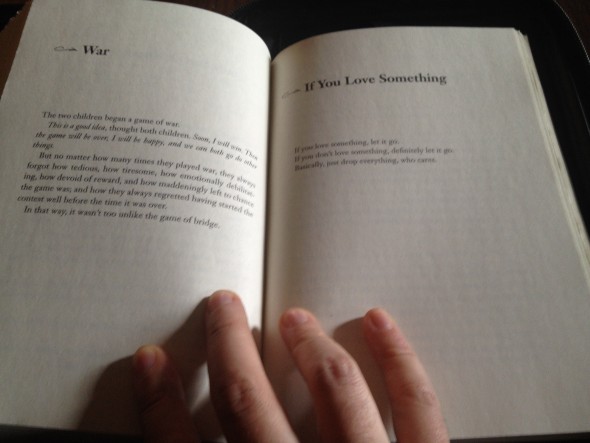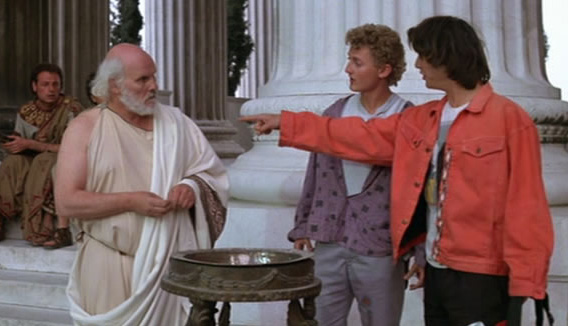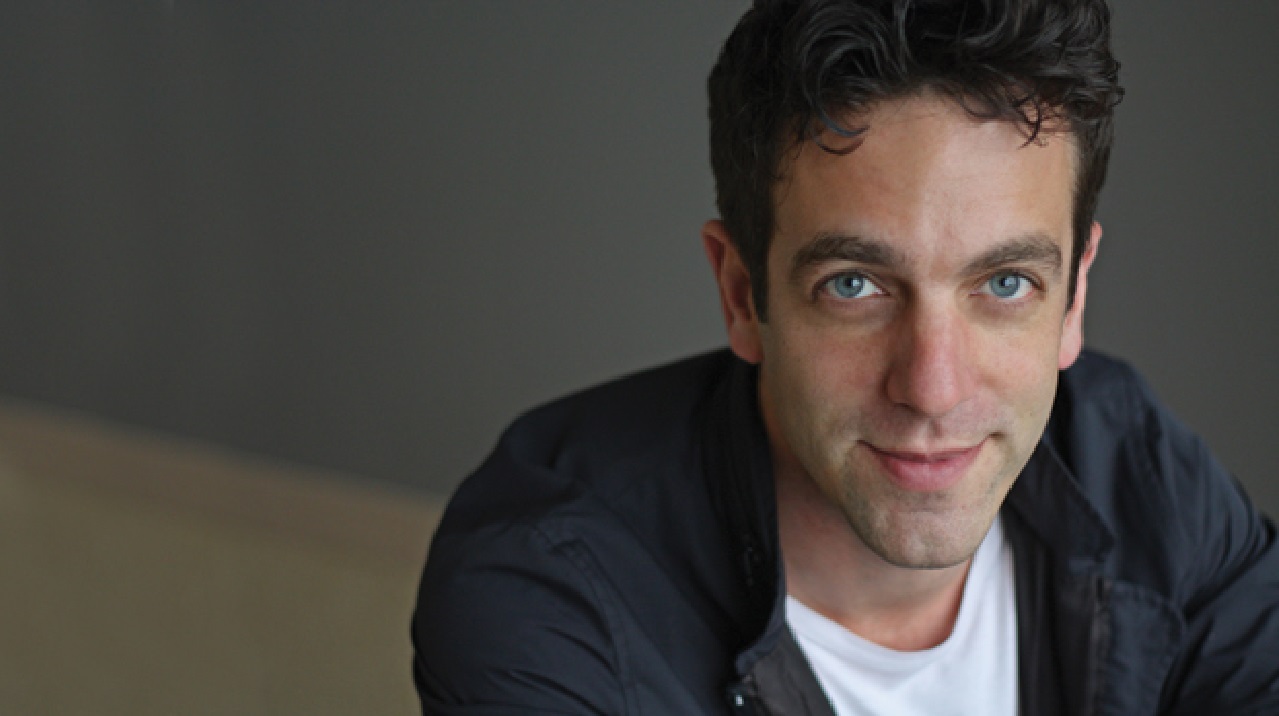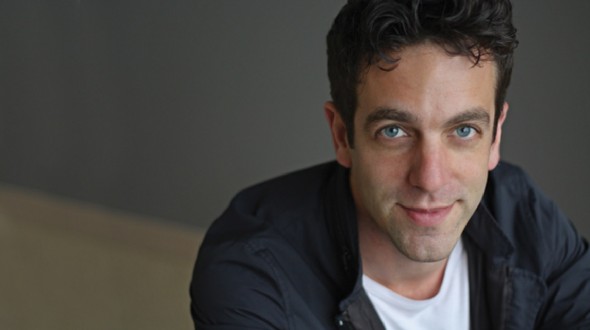You probably know B.J. Novak from his role as lovable hipster-douchebag Ryan Howard on the U.S. version of the popular single-camera comedy The Office, which ran on NBC from 2005 to 2013. You may also know him as Private First Class Smithson “The Little Man” Utivich in Quentin Tarantino’s 2009 alternate-history World War II revenge movie, Inglourious Basterds.
But if you’ve been hanging around with me since February of 2014, you know B.J. Novak primarily as…my nemesis.
You see, Benjamin Joseph Manaly “B.J.” Novak, in addition to being a comedian, television writer and actor and director and producer, is also the author of the short story collection “One More Thing: Stories and Other Stories,” published by Knopf Doubleday. Novak’s deal with Knopf was reportedly in the seven-figures, with the book debuting at #4 on the New York Times Hardcover Fiction Bestseller list. And here’s the thing: it’s really good. Like really, really good. Unfairly good. Infuriatingly good, actually. The guy can write. His stories are funny and sweet and insightful – they’re about things. They’re everything that modern short stories ought to be. B.J. Novak deserves his success. He’s talented as hell and has clearly worked long and hard on his craft and it’s paid off for him. I shouldn’t begrudge him his success.
So why does it make me so angry?
I’m not the kind of person who gets jealous very often – sad, anxious, sleepy (so sleepy), yes – but not jealous. So it really took me a while to understand that the more I enjoyed the stories in his book, the more it tore me up inside. Reading One More Thing for the first time last year, I found myself texting photos of pages from the book to my friends, almost involuntarily, including my own subtitles of ever-increasing awe mixed with enmity.

Stories © B.J. Novak. Fingers © Richard Rosenbaum.
Because ordinarily I am an impassive, unfeeling automaton (just ask any girl I’ve ever dated – zing!), this realization disturbed me: I was jealous of B.J. Novak. Jealous! Me! It was important to get past this feeling not just because it was interfering with my enjoyment of his (again, really excellent) work, but also because this is no way for a person to live his or her life. We’ve all got enough problems without obsessing over somebody else’s talent.
This rang a bell. In 2004, I was newly graduated from university with a Bachelor’s Degree in English & Philosophy, and so, logically, I’d started working at a chain bookstore, where my primary responsibility consisted of pointing at The Da Vinci Code. Also, I got a pretty sweet employee discount. At this point, a book of popular philosophy by Alain de Botton called Status Anxiety was published and came to my attention – because I had to shelve it. During lunch breaks I devoured it (and sandwiches), because it seemed to me that this book correctly diagnosed the stress I perceived all around me, the major malady of the consumerist age, which the author dubbed status anxiety: “A worry, so pernicious as to be capable of ruining extended stretches of our lives, that we are in danger of failing to conform to the ideals of success laid down by our society and that we may as a result be stripped of dignity and respect; a worry that we are currently occupying too modest a rung or are about to fall to a lower one.”
De Botton, in the second half of the book, cites a story wherein Socrates, upon seeing a procession of gold and jewels being carried around through Athens, remarked (I’m paraphrasing), “It always amazes me how much stuff there is that I don’t want.” I read that and I was like: yeah, man! Who needs it! Most of the money I made I spent on books and coffee (this is still true), and I had no interest in the expensive clothes and the solid gold houses and the rocket cars and other stereotypical symbols of material success. I wasn’t jealous of Bill Gates’s wealth or Brat Pitt’s fame. I felt like I was so above all that stuff.

The one on the left. No, not that one. The other one.
Ten years later, here comes B.J. Novak to teach me that I’m not so Socrates after all. So here I went crawling back to Status Anxiety for some help.
Of the five causes of status anxiety that de Botton identifies, the second is expectation. And that chapter opens with a quote about envy that instantly resonated:
It is not a great disproportion between ourselves and others which produces envy, but on the contrary, a proximity. A common soldier bears no envy for his general compared to what he will feel for his sergeant or corporal; nor does an eminent writer meet with as much jealousy in common hackney scribblers, as in authors that more nearly approach him. A great disproportion cuts off the relation, and either keeps us from comparing ourselves with what is remote from us or diminishes the effects of the comparison.
-David Hume, A Treatise on Human Nature
I italicized the important part, because there it is right there: I want to see myself as a writer, and I long to be taken seriously as a writer by the writers whom I take seriously. It’s B.J. Novak who inspires such strong envy in me because I can identify with him in a way that I can’t identify with, say, Dan Brown (whom I hate) or Salman Rushdie (whom I like) – both are writers with much more commercial success than B.J. Novak but I don’t see any of myself in them because neither of them are anything like me. Salman Rushdie may be my general, but B.J. Novak is my sergeant.
B.J. Novak and I are both university-educated, middle-class, North American-born Ashkenazi Jews. We’re the same age (actually, he’s four months younger than me, the bastard). He’s maybe slightly below average height (they didn’t call his character in Inglourious Basterds “The Little Man” for nothing), but he’s still taller and better-looking than I am. From reading his stuff, I think we have many of the same literary influences. He has been much more successful in his writing career than I have, but that is because he’s got more talent than I do. In other words, B.J. Novak is just like me, only better.
And that, I finally realized, is the root of my envy. To paraphrase some wise men, I hate him ‘cause I ain’t him. But it feels like I almost could have been. Through no fault of my own, I have nevertheless failed to be B.J. Novak, and that kind of sucks for me.
Which I am perfectly aware is crazy. It’s a truism that jealousy works the opposite way that you want it to; my envy of B.J. Novak doesn’t affect him in the least but it does affect me. Negatively. Because as long as he remains a source of envy it will dampen my enjoyment of his work and impede my own improvement as a writer and a person. I am not now, nor have I ever been B.J. Novak, and I never will be. And I’ve got to learn – somehow – to be okay with that.
De Botton correlates the West’s seeming epidemic of envy (that “Keeping Up With the Joneses-ism that fuels conspicuous consumption but seems to do nothing but put us into deep financial and psychological debt) with the increasing egalitarianism of our age. Back in the day, Aristotle (the student of Plato, the student of Socrates, who didn’t want all that stuff anyway) was perfectly comfortable professing that the sociopolitical and economic inequality between slaves and their masters was only natural, reasonable, and morally acceptable; but since then, democracy and capitalism have invested us with the idea (if not completely the reality) that everyone is equally deserving of rights and success. As equality has increased and obviously improved the state of the world, it has its negative side as well. De Botton cites Benjamin Franklin’s autobiography as the prototype for the “self-help” genre, where we can easily draw the kinds of theoretical parallels between the principles on which the United States was founded – equality for all, and economic and political freedom (aside from that whole “slavery” thing – oops!), and Franklin’s own life, starting from poverty and squalor and rising on his own to become one of the most powerful and influential men in the world. From then until now, we’re increasingly bombarded with the message that we can do anything that we set our mind to, and so if we find ourselves not having achieved all our wildest dreams, we can only conclude that either 1) we’re not trying hard enough, we don’t want it enough, or 2) someone else is deliberately keeping us down or taking our rightful share of the pie, or both. This second part leads to the kind of conspiracy thinking that is also, terrifyingly, on the ascendant in our society, on both sides of the political spectrum. Not that corruption and injustice aren’t real things that really hurt people; but the fact is that talent is not distributed equally or based on moral merit, and success – economic or artistic – is not a zero-sum game. B.J. Novak definitely did not take any pie of mine.
If western egalitarianism has convinced my dumb serpent-brain that my rightful place in the world has been somehow stolen, can my more sensible frontal lobe or whatever help me understand that this is irrational and counterproductive? Two of the solutions that de Botton offers to combat status anxiety are philosophy and art, so in the interest of eliminating my envy of B.J. Novak I decided to turn to Immanuel Kant and…B.J. Novak.
Does Kant say anything about envy? Turns out, yes. In The Metaphysics of Morals he writes:
Envy is a propensity to view the well-being of others with distress, even though it does not detract from one’s own. When it breaks forth into action (to diminish their well-being) it is called envy proper; otherwise it is merely jealousy (invidentia). Yet envy is only an indirectly malevolent disposition, namely a reluctance to see our own well-being overshadowed by another’s because the standard we use to see how well off we are is not the intrinsic worth of our own well-being but how it compares with that of others…As for the power of examples (good or bad) that can be held up to the propensity for imitation or warning, what others give us can establish no maxim of virtue. For a maxim of virtue consists precisely in the subjective autonomy of each human being’s practical reason and so implies that the law itself, not the conduct of other human beings, must serve as our incentive. Accordingly, a teacher will not tell his naughty pupil: take an example from that good (orderly diligent) boy! For this would only cause him to hate that boy, who should not serve as a model but only as a proof that it is really possible to act in conformity with duty. So it is not comparison with any other human being whatsoever (as he is), but with the idea (of humanity), as he ought to be, and so comparison with the law, that must serve as the constant standard of a teacher’s instruction.
Except, you know, in German. But as usual, Kant is right. This modern idea of having role models to emulate, and despairing when our celebrity heroes display signs of humanity, might actually being doing more harm than good. Because as we compare ourselves to other people, we’re comparing our success or lack thereof with people who have succeeded only to be themselves. What Kant tells us, though, is that this standard is inherently flawed. Ben Franklin’s example, for instance, and the whole subsequent cult of infinite potential for happiness and accomplishment, ought, according to Kant, to convince us not that we can do anything and then make us despair if we fall short, but that it is possible to do what’s right. Doing what’s right should therefore be the engine of our self-esteem, because it is an objective standard that everyone really does share equally in common. Maybe the only one. And in this case, Kant would say that doing what’s right means making art that is not only pleasant or even beautiful but true and good.
As the modern Ben Franklin, carrier of the torch of the potentially dangerous role model philosophy, de Botton nominates the writer and motivational speaker Tony Robbins. In Robbins’ 1991 book, Awaken the Giant Within, he straight-up insists, explicitly and earnestly, that “we all have the capability to carry out our dreams,” and that “if you truly decide to, you can do almost anything.”

Also: get sued for plagiarism.
Strangely, Tony Robbins is the most direct link that I could find between Status Anxiety and One More Thing. Many of Novak’s stories are very concerned with celebrities and public figures; one piece in the collection is called “Walking on Eggshells (or: When I Loved Tony Robbins),” and it tells of a woman who has become obsessed not only with Tony Robbins’ philosophy of self-actualization, but with Tony Robbins himself, and has made it her goal to sleep with him. When she seeks him out and explains this to him, he at first demurs, but when she shows how furiously devoted she is to this plan, “Something about [her] intensity awakened something in him. The challenge fired him up in a way that [her] looks, so far, hadn’t.” Robbins agrees to help her become the sort of person who could sleep with Tony Robbins, physically remaking her with cross-training and hair extensions, and getting her to undermine his marriage bit by bit so that it will eventually collapse. But after seven weeks of this, so close to success, she quits.
“Tony Robbins, the motivator, the man I had fallen in love with, wasn’t the only person looking at me anymore; now there was another man starting to come out from behind those eyes that had always reminded me of locked steel gates. And it was exciting and scary, if those are even different things, to realize that I was on the verge of something so big with this new person I didn’t know, someone I might never know, something with no end date, no target, no limit.”
As she approaches her goal, she discovers that it was not what she wanted after all. It was the feeling of wanting it that inspired her, and actually achieving it would not really have satisfied her. It turned out that she did not want what she thought that she wanted, and so she became disillusioned – fortunately, before it was too late to turn back. She wanted Tony Robbins, but who she was getting was Tony Robbins. There was no way for her to have the Tony Robbins persona she knew from his books and videos; she could only have Tony Robbins the human being, who could not give her the feeling that she sought, that feeling of walking on eggshells.
So do I, can I, really want to be B.J. Novak? Or do I only think that I do? Certainly he isn’t what I imagine him to be. He has accomplished impressive things and achieved success, but he, like everybody else, must have problems of his own – it’s only the fact (as Kant points out) that I’m reluctant to see my well-being overshadowed by his because I’m comparing my life to his life, but whereas I am completely aware of all of my own shortcomings and failures, all I know about him are the ways he is similar to me, except better. I don’t know the real B.J. Novak at all, so how can the comparison ever be fair? I can look at his talent to my talent and his success and my success and see that mine is lacking relative to his, but so what? What I’m not doing is acknowledging that the intrinsic value of my own well-being has absolutely nothing to do with anything that anybody else has or does. Particularly when my knowledge of the people with whom I’m comparing myself is so minimal, so selective, so ultimately arbitrary.
Novak sees this too. In one of his stories, which I will reproduce here in full because it’s short and fair use is a thing, this exact situation crops up, which I had totally forgotten until I went back and reread the book in preparation for writing this article. Here is the story:
Kate Moss
When I was sixteen, I would come home from school every day and stare at pictures of Kate Moss for hours.
Then one day, on a school trip to New York, I saw Kate Moss. I went up to her and pulled her coat.
“Are you Kate Moss?” I said.
“Of course,” she said.
“How did you become Kate Moss?”
She moved her face close to mine and smiled and whispered.
“Every day,” she said, “when I came home from school, I would stare at pictures of Kate Moss for hours, until one day, I was Kate Moss.”
“How many hours?”
“Four.”
When I went back home, I tried staring at pictures of Kate Moss for four hours a day.
Now I’m Kate Moss.
So, it’s a happy ending. And it’s funny and true precisely because it illustrates the absurdity of the whole envy thing and suggests, by its converse, the more productive alternative. Alain de Botton notes than in past eras, when we feared a threat to our status, we might challenge our opponent to a duel. “Though occasional duels were sparked by matters of objective importance,” he writes, “the majority had their origin in small, even petty questions of honour. In Paris in 1678, for example, one man killed another who had said his apartment was tasteless. In Florence in 1702, a literary man took the life of a cousin who had accused him of not understanding Dante. And in France under the regency of Philippe d’Orleans, two officers of the guard fought on the Quai des Tuileries over the ownership of an Angora cat. For as long as it lasted, duelling symbolised a radical incapacity to believe that one’s status might be one’s own business, a value one decided on and did not revise to accord with the shifting judgments of others.” That radical incapacity persists to this day, but instead of fighting each other to the death over it, now we simply make ourselves miserable. Just as killing someone who thinks your décor is tacky solves nothing, you can’t become Kate Moss by simply concentrating really hard on Kate Moss. You can’t become Kate Moss no matter what you do, unless you have always already been Kate Moss. And I won’t become B.J. Novak by getting upset that I’m not B.J. Novak. On the other hand, B.J. Novak may have become B.J. Novak by working as hard as he could at being B.J. Novak. That’s almost certainly how he did it, in fact.
As distressingly Tony Robbins as it may sound, this notion has actually managed to comfort me a little, so if you’ll forgive one moment of cheap sincerity in an ocean of self-indulgent overthought: although you haven’t got what it takes to be anyone but who you are, fortunately, you have everything it takes to be yourself.


This was an excellent article, man! Have you read Killing Bono, or (as it is known in Europe) I Was Bono’s Doppleganger by Neil McCormick?(Funny, how the American publishers didn’t believe Americans would know what a doppleganger was, so they went with the violent gerundic title, but I digress…)
It documents a very similar envious obsession between a classmate of Bono’s who, in many ways, could have been–and thinks he should have been–as big of a rock star as Mr. Hewson himself. It’s a bit whiny and sour grapes at time, but has some interesting observations about fame and the simple twists of fate in creative people’s lives.
This is great. I totally sent this to my daughter since we have some variation of this conversation quite often.
Thanks for the article. I used to feel this way about my writing but as time’s gone on, I’m my own person and comparing myself to the success of others isn’t going to help things. In fact the thing which helped me hit that realisation was my brother. He’s no longer pursuing film-making, but he really wanted it. He’s jealous of the Burch siblings, of Red Letter Media, of Balloonshop. All people who came from very little and actually made something of themselves online. He laments the success of RLM when we talk about a video of theirs, letting that jealousy crowd out any actual quality. Seeing that in someone else really helps make you realise the futility of it.